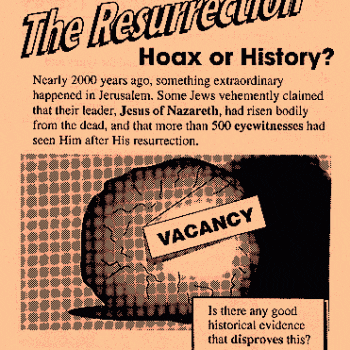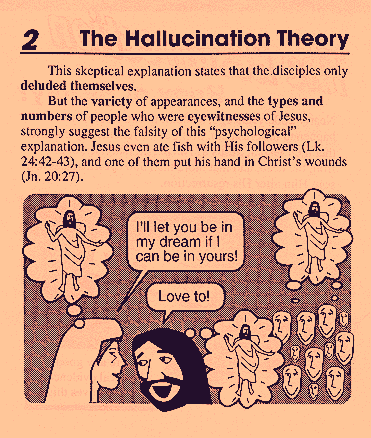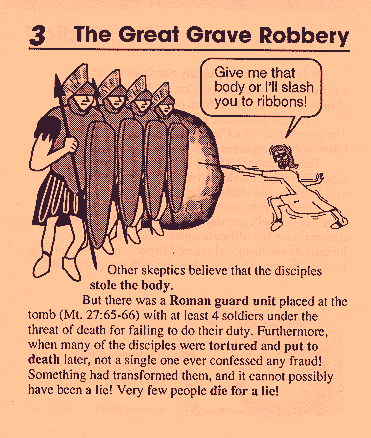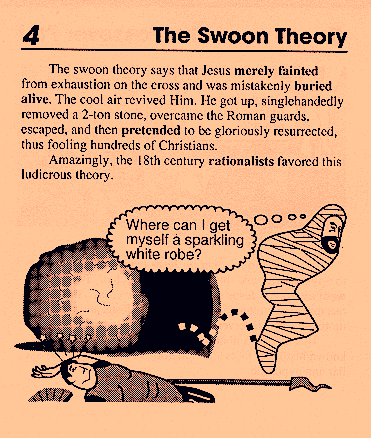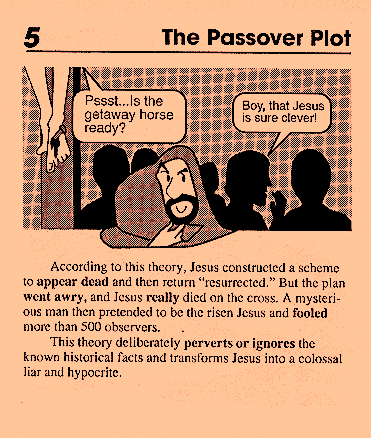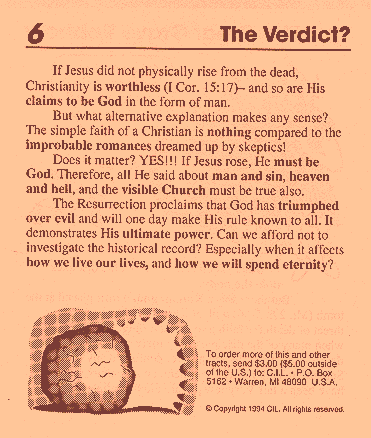
This is the continuation of a series of exchanges on this general topic:
Pearce’s Potshots #17: Doubting Thomas & an “Unfair” God [3-17-21]
Debate w Atheists: Doubting Thomas & an “Unfair” God [3-17-21]
Pearce’s Potshots #18: Doubting Thomas & Evidence [3-18-21]
Pearce’s Potshots #19: Doubting Thomas & a “Mean God” [3-19-21]
It started out with an analysis of the Doubting Thomas story, by atheist Jonathan MS Pearce. The he tried to pivot from the Bible to straight philosophy, which is fine, but not what I do in my apologetics. I only tangentially touch upon philosophy of religion. Now, one “eric” (words in blue below, from a combox on Jonathan’s site): a friendly atheist with whom I’ve had several dialogues, tries to pick up the ball with an analogy. But first I explain why I didn’t respond to Jonathan’s third counter-reply to me on this topic:
*****
This is one for some [academic] Christian philosopher to grapple with. I replied to the initial Doubting Thomas paper precisely because it was a claim about Holy Scripture. That allows something objective (i.e., the text in question, biblical exegesis, and related cross-texts, in relation to systematic theology) to be discussed. That’s at least 90% of what I do with atheists. They go after something in Scripture. I offer counter-replies.
Jonathan wants to discuss the question: “Is the alleged ‘God’ unfair?” [a philosophical discussion]
What I do as an apologist is explain and defend the position: “Is God as understood in the Bible and Christianity ‘unfair’?” [a theological / exegetical discussion]
This purely philosophical stuff (with regard to this particular question) is subjective, and in my opinion, it’s futile for most Christians to interact with it, because it goes round and round and nothing is accomplished (precisely because it is a subjective argument and there is no measuring standard). It’s a wax nose that can be molded in whatever way the atheist wants to twist it. So I leave it to Christian philosophers to contend with. I don’t claim to be any kind of philosopher (other than a very amateur “armchair” one). I’ve written a lot about the problem of evil and on predestination, but that’s about it.
I did get a big kick out of Jonathan claiming that I finally “got” something because (so he thinks) he explained it to me and walked me through it. As I clarified, he misunderstood me on a key point. I clarified it, and now he is spinning it so that he can pretend that I only got it after he explained it to me. Nice try. I got it all along because it was my opinion all along. This is essentially calling me a liar, and doubting my self-report that I was misunderstood. I admitted that my wording could have been better (because I try to be intellectually modest and open-minded as to fault). That should have been the end of it. But unfortunately it wasn’t, and Jonathan sunk into pettiness (which I don’t perceive to be his usual style), in order to avoid being wrong as to what my position was.
Again: this present post is almost wholly within his field of philosophy of religion, so I pass. Likewise, when Jonathan enters my domain of Bible study and exegesis, he has taken many passes (not replying to about 7-8 of my replies to him, by now). He has revealed himself as woefully ignorant on many many things in that field (as we would expect). The nature of the present argument in this post above is not my field. I recognize my own limitations, and I want to see the most qualified Christian (i.e., a professional philosopher or maybe a philosophy grad student) take this on and refute its errors. I think it deserves that consideration as a serious piece (i.e., minus the nonsense about me in it).
***
[now onto eric’s reply]
There are several fallacies and false premises and straw men in play here (as always in anti-theist atheist arguments). Let’s pick them apart, one-by-one. You cited my statement which is indeed a description of how God approaches every human being. He wants no one to “perish” (i.e., spiritually, in terms of eternity), as the Bible says. So I wrote: “I think God does provide sufficient evidence (of all sorts) for every human being”. That’s the backdrop and it’s my premise (agree or disagree) and that of the Bible and [virtually all of non-Calvinist] Christianity.
So you come along (after promptly discontinuing our previous dialogue on the same topic, just when it was getting interesting and might have actually accomplished something) with what you think is a knockout / compelling reductio ad absurdum analogy:
Alice and Bob are both going to jump out a 10th story window. Alice responds to emotional pleas. Bob responds to empirical examples. Charlene knows a perfect emotional plea. She also has an egg she can drop out the window, which will go splat and convince Bob that he’ll go splat too. Charlene makes the emotional plea to Alice. She steps back, safe. Charlene chooses not to do the egg-drop for Bob. Bob steps out the window, goes splat, dies.
Along comes Jonathan, who asks: why didn’t Charlene do the egg drop to save Bob? Dave Armstrong responds: egg drops are not the only way Charlene has to convince people. The fact that Charlene offers many non-egg-drop ways to convince people undercuts your argument that Charlene should’ve done the egg drop for Bob.
I must admit, DA’s argument makes no sense to me.
Note that this is already inconsistent with what I stated as my overall premise. In order for the reductio analogy to succeed, it has to actually be dealing with my premise, showing how it is incoherent and unworthy of belief. By nature, it is a critique of my views, not a statement of atheist ones per se.
Once again, it assumes (as in Jonathan’s thought) that one little empirical demonstration [and this particular one] would be sufficient to convince Bob not to jump (as if Bob didn’t know that he would go splat, too, if he jumped out of the ten-story window). This is by no means the case, so the analogy is already fatally weakened by that consideration. But we’ll set that aside for the moment, for the sake of argument.
The other fallacy is that it seems to be assumed that there are no other conceivable ways that Charlene could save Bob. All she can do in this presentation is drop the stupid egg. That’s the sum total of the “weapons” in her arsenal of suicide prevention tactics. But that’s dumb, too. Neither reality overall, nor even suicide prevention works this way: “one size fits all.”
It assumes, moreover, that Charlene is unwilling to do any other method other than this one.
Moreover, Charlene is not omniscient as God is. This is a vast difference, making the analogy null and void in and of itself. God knows how any human being will react to His free offers of love and mercy and salvation: not only what they will actually do (since He is outside of time, too) but also what they would do in any conceivable possible or hypothetical situation in any possible universe (as part of his middle knowledge or scientia media: which is directly indicated in the Bible, too, by the way).
Therefore, if Charlene were God, and the jump out of the window represents entrance into the afterlife, and Charlene / God knew (out of omniscience) that the egg-drop would have saved Bob, then God / Charlene absolutely would have done that to save him. Yet you say she didn’t do it, and this is supposed to represent how God would supposedly act. It does not at all, and as I said, it goes contrary to my premise; therefore, it doesn’t refute my view because it doesn’t deal with it in the first place. It’s the creation of a straw man, which is then shot down. I certainly agree 100% that the analogy presents an objectionable scenario. But I 100% disagree that it is my (and God’s scenario).
Lastly, if Charlene were omniscient and all-loving as God is, then she would have known with certainty whether or not the egg-drop would work or not and would have acted accordingly. And Charlene / God would have known with certainty that if it didn’t work, what would work (and so would have done what worked). And God / Charlene also knows if and when nothing whatever will work to alter a person’s free will choices of rejection of God and salvation: that some people will reject all and any such attempts, which would explain not (necessarily or obligatorily) making any attempts in those cases, because they were destined to be futile.
Likewise, Jesus knew that physically appearing to Thomas would work for him (as a hard-nosed empiricist type), therefore He appeared. But He also knew that such an appearance would not work for everyone — hence His statement in Luke 16 that even folks rising from the dead would not convince many people: as indeed it didn’t convince most of the Jews at the time of Jesus’ Resurrection. He would have known, for example, that whatever He said would not have saved Judas: so we don’t see Him begging and pleading with Judas to repent. He already knew that He wouldn’t no matter what: thus freeing Himself from the moral obligation to do all that.
So Jesus would have used other ways to persuade others: as much as possible to save any given individual. But at the same time He will not force anyone to be saved. This is the “sufficiency” vs. “efficiency” argument. “Sufficient” knowledge for salvation means that one knows enough to be saved. But he or she still has to accept the free grace and the knowledge, and act accordingly. That’s the limitation of sufficiency. “Efficient” salvation, on the other hand, is the false scenario where there is no human free will (as in Calvinism).
Therefore, God simply decrees from all eternity (or from after the fall of man, in a somewhat weaker form) that group of persons X are saved and in the elect and that group of persons Y are damned and non-elect. This works with 100% efficiency: all in both groups wind up exactly where God willed them to end up, minus any input of their free will choices (because in fact they have no free will). Non-Calvinist Christians agree with atheists that this is an outrageously unfair and unjust system and makes God — in the final analysis — an evil tyrant or capricious moral monster.
Jonathan poked at my use of “sufficiency”: not understanding this well-known distinction that is made in Christian soteriology (theology of salvation). His ignorance of theology is never surprising. I’ve never met a well-known atheist figure yet who did properly understand Christianity (they all rejected straw men to some — or a large — extent, if they had been Christians).
This is why I have analyzed many deconversion stories. Nothing makes atheists more angry and furious than that. I do them because I am showing how these atheists rejected straw men, not the real thing, when they rejected what they present as “Christianity.” I’ve never examined one where this wasn’t the case. No exceptions (and I’ve done 30 or so). Atheists of the anti-theist type blithely assume that they are the superior and smart people and that Christians are ignoramuses, idiots, and imbeciles. That’s why they get so FURIOUS when a Christian shows how their own reasons for rejection of Christianity fall flat (being based on false notions and straw men).
Such a thing is impossible (so they think) and so, in order to counter the outrageousness and utterly bad form of the “impossible becoming possible” they attack the Christian rather than admit their own ignorance as to the nature of various aspects of Christianity. But I digress. Back to the post I am replying to.
This is part one of the “atheists are lying” argument for divine hiddenness.
I never claimed that at any time, nor insinuated it, as carefully explained at length in one or more of my replies to Jonathan. So thanks for attributing to me something I never did. If you’re so convinced that this is my position, cite something I have said. I have, however, drawn the distinction between the “open-minded agnostic” and “God-rejecters”. Even the latter in many cases, I believe, chose to believe in falsehoods, with a perfectly sincere belief. They chose to go down a wrong road, by means of false premises that they embraced. It doesn’t necessarily mean they are flat-out lying. This makes it all the more tragic, because they would then be essentially damned, by their own false choices, rather than deliberate rebellion against that which they know to be true. But in some cases, the latter is true. There are indeed utterly evil, corrupt, wicked people in absolutely every class.
I just never claimed this to be the case with atheists en masse.
You see, what we silly Charlene-doubters don’t understand is that Charlene did convince Bob to step back from the ledge.
Well, she clearly didn’t convince him in your analogy, which supposedly accurately represents some Christian position (one I have never encountered in my 44 years of observant Christianity; even Calvinism is not as arbitrary and absurd as what you present). If God / Charlene did, in fact, try to reach Bob in other ways (which is what we claim), then they would have to be present in the analogy, for it to be accurate, wouldn’t they? If you present something in a grotesquely distorted form, then what it supposedly represents will be thought of accordingly. But since it’s a caricature in the first place, it loses all force of argument and is an empty charade.
But Bob is prideful and would rather die than admit Charlene convinced him. So he jumps anyway. Sounds crazy, right?
There are people like that, whether atheism or Christianity are true. Or do you wish to deny that there are human beings with pride who can never admit they were wrong? To me, this is self-evidently true whether God exists or not. If He does, there are people so evil that they would reject Him even if He appeared as He did to Thomas. After all, in Christian theology, the devil himself was one of God’s highest angels, yet even he managed to reject God (knowing full well what God was like in his own experience), thinking he had a better way.
But wait, it gets worse! Because you are a Bob. Charlene has convinced you too. And if you say otherwise, you must be lying. That’s the argument here – that’s what we’re supposed to believe.
It’s a gross caricature in many ways, as explained. You’re capable of much better than this. You have made much more respectable arguments in dialogue with me. This one falls flat.
What you don’t get (and what I have explained in these four responses) is that Jesus knew beforehand who would respond to His message or miracles and who would not.
This is part two of the “atheists are lying” argument for divine hiddenness.
It has nothing to do with any of that. It’s an argument from God’s benevolence combined with His omniscience.
You see, Bob is lying to himself and to everyone else about egg-drops convincing him he’ll go splat; an egg-drop wouldn’t really convince him.
There are any number of things that might convince him, or none. The analogy isn’t in-depth enough to address that. It’s simplistic and naive (which has been the problem with the atheist view throughout this whole debate). The question comes down to “how much evidence is sufficient for someone to believe in God and His salvation?” That’s the “$64,000 question” in atheist-Christian discussions.
Apologetics tells us this must be true, since Charlene didn’t save him via egg drop.
Apologetics does no such thing. Our actual view is if Charlene represents God, then she would do absolutely everything to persuade him to accept her existence and salvation. Bob would then have the choice of how to respond, and this includes rejection (which may come about for innumerable reasons: most of which are not simply “lying to himself” or what-not), and this free choice includes utter rejection of what is either 1) not understood or [in extreme cases] 2) understood full well and still rejected.
Extending this to other Bobs in the world, we must similarly conclude that no, none, zero, zilch humans on Earth would be convinced (only) by egg drops – and again, this comes from the apologetic demand to explain why Charlene never uses them.
Every individual is different, and treated accordingly by God.
Lastly, if you claim you would be convinced by an egg-drop, well you’re either self-delusional or lying.
You’re big on this element, but it plays little or no part in my argumentation. It’s just a caricature of apologetics and the Christian view, to the effect that we think everyone is lying who disagrees with us. Some individual Christians who are stupid and ill-educated believe that. It doesn’t follow that our system itself teaches it.
***
Photo credit: Insomnia Cured Here (10-12-07) [Flickr / CC By-SA 2.0 license]
***
Summary: This is my latest reply (fifth one) on the topic of a supposedly “hidden” God and an “unfair” God. I respond at length to a gross caricature of a reductio ad absurdum analogy about how God supposedly is terribly negligent in seeking to save souls.
***









